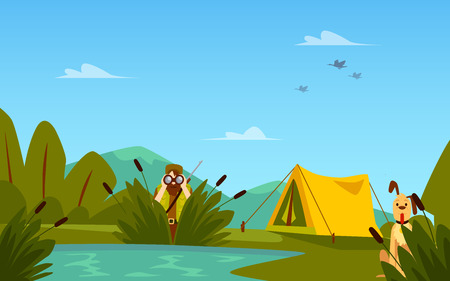Poor Communication and Expectations
One of the most common mistakes first-time group campers make is not clearly communicating plans and expectations before the trip. It might seem like everyone is on the same page, but without solid communication, things can quickly become confusing or stressful once youre out in the woods. Simple details like who’s bringing what, when people are arriving, or how meals will be handled can turn into big issues if left unspoken.
Why It Matters
When you’re camping with a group, everyone depends on each other to make the experience smooth and fun. Without clear communication, you could end up with three people bringing hot dog buns and nobody packing a tent. Or maybe someone shows up late with all the firewood and leaves everyone cold and frustrated for hours.
Common Areas Where Miscommunication Happens
| Topic | Potential Problems |
|---|---|
| Arrival Times | People show up at different times, causing delays or missed setup help |
| Food Planning | Too much of some items, not enough of others; dietary needs not considered |
| Gear Responsibilities | No one brings essential gear like cookware or lanterns |
| Campsite Duties | Tasks like cooking or cleaning aren’t divided fairly, leading to frustration |
How to Avoid This Mistake
- Create a shared checklist with items like tents, food, and tools so nothing is forgotten.
- Assign roles ahead of time—who’s cooking, who’s bringing firewood, who’s setting up tents?
- Use a group chat or planning app to keep everyone updated on changes or new ideas.
- Have a quick meeting (in person or online) before the trip to go over plans and expectations.
A little planning goes a long way. When everyone knows what to expect and what they’re responsible for, the whole group can relax and enjoy their time outdoors.
2. Overpacking or Underpacking
One of the most common mistakes first-time group campers make is not packing the right amount or type of gear. Its easy to get carried away and bring too much stuff, which can clutter up shared spaces, fill up car trunks, and make setup more stressful than it needs to be. On the flip side, forgetting essentials can lead to uncomfortable or even unsafe situations for everyone.
Overpacking: Bringing Too Much
New campers often think they need to prepare for every possible situation, leading them to pack everything from extra tents to multiple cooking sets. While being prepared is good, overpacking creates unnecessary bulk and confusion at the campsite.
Common Items People Overpack:
| Item | Why It’s Too Much |
|---|---|
| Multiple coolers | Takes up space; one well-organized cooler is usually enough |
| Extra cookware | Group can usually share a basic set of pots and pans |
| Too many clothes | Bulky and unnecessary if you layer properly |
Underpacking: Forgetting Essentials
The other side of the coin is forgetting things that are actually important. This becomes a group issue when someone has to borrow gear or when time is wasted making last-minute store runs.
Essentials Often Forgotten:
| Item | Why You Need It |
|---|---|
| Extra layers | Nights can get cold even in summer; layering keeps you comfortable |
| Headlamps/flashlights | Crucial for moving around camp after dark |
| Campsite tools (e.g., mallet, multi-tool) | Makes setting up tents and managing gear easier |
Packing Tip:
Create a shared checklist with your group ahead of time. Divide responsibilities so each person brings specific items. This avoids duplication and ensures nothing essential gets left behind.
Smart packing means everyone enjoys the trip without stress—and no one ends up wearing shorts in 40-degree weather!

3. Ignoring Campground Rules and Etiquette
When youre camping with a group, its easy to get caught up in the fun and forget that youre sharing the space with other people. One of the biggest mistakes first-time group campers make is ignoring campground rules and basic etiquette. These guidelines arent just there to be strict — they help everyone enjoy their stay and keep the environment safe and clean.
Common Rules That Get Overlooked
Whether youre camping in a national park, a state campground, or a privately-owned site, youll likely run into some standard rules. Heres a quick breakdown of the most commonly ignored ones:
| Rule | Why It Matters |
|---|---|
| Quiet Hours | Most campgrounds have quiet hours between 10 PM and 6 AM. Loud music or conversations can disturb others trying to sleep. |
| Pet Policies | Some sites require pets to be leashed or dont allow them at all. Ignoring this can lead to fines or complaints from other campers. |
| Waste Disposal | You must pack out your trash or use designated bins. Leaving waste behind attracts wildlife and pollutes nature. |
| Campsite Boundaries | Each group gets a designated area. Spilling over into someone elses space without permission is disrespectful. |
The Impact of Breaking the Rules
You might think skipping a rule here or there isn’t a big deal, but it can lead to serious consequences. Here’s what could happen if your group doesn’t follow campground etiquette:
- Tension with neighboring campers: Nothing ruins a trip faster than getting into arguments with others over noise or space.
- Poor reviews for your group: If you’re part of an organized outing (like scouts or youth groups), repeated issues can lead to being banned from future reservations.
- Parks issuing fines or warnings: Rangers do regular checks, and violations can cost your group money—or even get you kicked out early.
Tips to Stay on Everyone’s Good Side
- Assign a rule-checker: Have one person in charge of reviewing the site’s posted rules when you arrive.
- Create quiet time reminders: Set phone alarms or designate someone to remind the group when it’s time to wind down.
- Campsite walkthroughs: Before leaving, do a quick sweep to ensure no trash or gear is left behind.
A little awareness goes a long way when youre camping in a group. Respecting campground rules not only keeps you out of trouble—it also ensures everyone has an awesome time outdoors.
4. Assuming Everyone Has the Same Skill Level
One of the most common mistakes in group camping—especially for first-timers—is assuming that everyone has the same level of outdoor experience. This can quickly lead to frustration, safety concerns, and an uncomfortable trip for some campers. Whether youre a seasoned hiker or its your friends first time sleeping in a tent, recognizing and respecting skill differences is key to a successful group outing.
Why It Matters
Different people bring different levels of experience when it comes to camping. Some may be familiar with setting up tents or starting a campfire, while others might not even know how to roll out a sleeping bag properly. Ignoring these differences can result in uneven workloads, unsafe situations, and group tension.
Common Issues That Can Arise
| Assumption | Potential Problem |
|---|---|
| Everyone knows how to set up camp | Some members struggle with tents or gear setup, causing delays and stress |
| Everyone can hike the same distance | Less experienced hikers may tire quickly or risk injury on tough trails |
| No need to explain safety procedures | Lack of knowledge about fire safety or wildlife precautions can lead to dangerous situations |
How to Avoid This Mistake
- Have a pre-trip conversation: Talk openly about everyones camping background and comfort level before heading out.
- Create mixed-experience teams: Pair less experienced campers with more knowledgeable ones for tasks like cooking or setting up tents.
- Plan inclusive activities: Choose hikes and games that accommodate all fitness and skill levels.
- Be patient and encouraging: Support each other without judgment—everyone starts somewhere!
The Takeaway
Your trip will be more enjoyable when everyone feels comfortable, safe, and included. Being aware of skill differences isnt just smart planning—its also a great way to build camaraderie and ensure that everyone has fun around the campfire.
5. Not Planning for Group Meals Properly
One of the most common mistakes first-time group campers make is failing to plan meals ahead of time. When nobody takes charge or theres no clear food plan, it can lead to duplicated items, forgotten essentials, or way too much of one thing and not enough of another. For example, you might end up with five packs of hot dog buns but no hot dogs—or everyone brings chips and nobody thinks about breakfast.
Why This Happens
It usually comes down to poor communication and assumptions. People assume someone else is bringing the grill, or that someone will just “figure it out” on-site. But when youre camping, especially in remote areas without stores nearby, winging it rarely works out well.
How to Avoid It
A little planning goes a long way. Assign meal responsibilities in advance and create a shared document or group chat where everyone can list what they’re bringing. This avoids overlap and ensures all meals are covered.
Sample Meal Planning Chart
| Meal | Person Responsible | Items to Bring |
|---|---|---|
| Friday Dinner | Alice | Burgers, buns, condiments, charcoal |
| Saturday Breakfast | Mike | Eggs, bacon, coffee, cooking pan |
| Saturday Lunch | Sara | Sandwich fixings, chips, fruit |
| Saturday Dinner | Jen & Tom | Tacos ingredients, tortillas, salsa |
| Sunday Breakfast | Luis | Pancake mix, syrup, butter |
Helpful Tips
- Create a shared Google Sheet or use apps like Trello or WhatsApp to coordinate meals.
- Include backup snacks in case a meal doesn’t go as planned.
- Label coolers and storage bins so people know where to find things.
If everyone knows what they’re responsible for and there’s a solid plan in place, your group camping trip will be smoother—and tastier!


